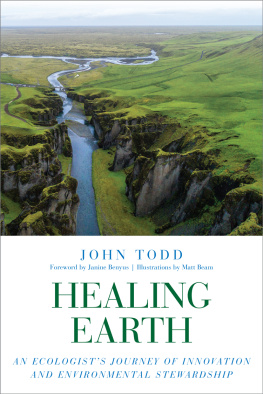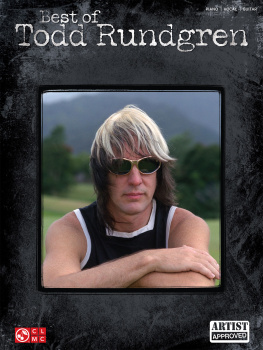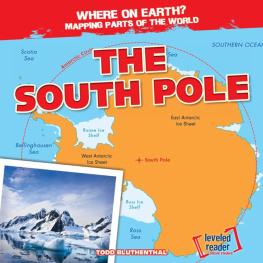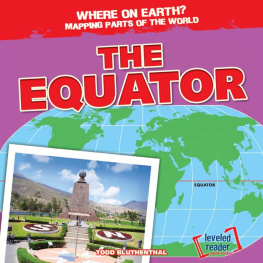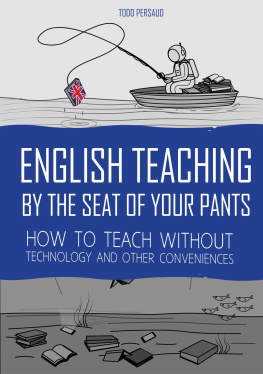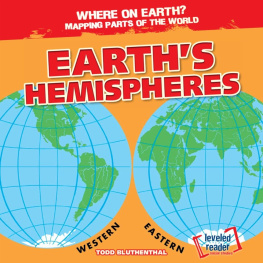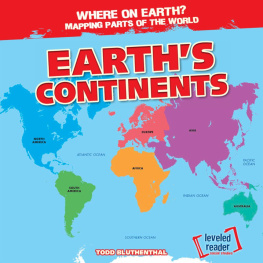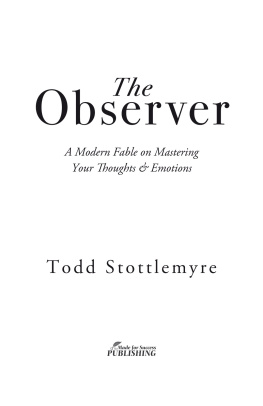Todd Veri - Better Bokashi: …Better Earth
Here you can read online Todd Veri - Better Bokashi: …Better Earth full text of the book (entire story) in english for free. Download pdf and epub, get meaning, cover and reviews about this ebook. year: 2013, publisher: BookBaby, genre: Home and family. Description of the work, (preface) as well as reviews are available. Best literature library LitArk.com created for fans of good reading and offers a wide selection of genres:
Romance novel
Science fiction
Adventure
Detective
Science
History
Home and family
Prose
Art
Politics
Computer
Non-fiction
Religion
Business
Children
Humor
Choose a favorite category and find really read worthwhile books. Enjoy immersion in the world of imagination, feel the emotions of the characters or learn something new for yourself, make an fascinating discovery.

- Book:Better Bokashi: …Better Earth
- Author:
- Publisher:BookBaby
- Genre:
- Year:2013
- Rating:4 / 5
- Favourites:Add to favourites
- Your mark:
- 80
- 1
- 2
- 3
- 4
- 5
Better Bokashi: …Better Earth: summary, description and annotation
We offer to read an annotation, description, summary or preface (depends on what the author of the book "Better Bokashi: …Better Earth" wrote himself). If you haven't found the necessary information about the book — write in the comments, we will try to find it.
Better Bokashi: …Better Earth — read online for free the complete book (whole text) full work
Below is the text of the book, divided by pages. System saving the place of the last page read, allows you to conveniently read the book "Better Bokashi: …Better Earth" online for free, without having to search again every time where you left off. Put a bookmark, and you can go to the page where you finished reading at any time.
Font size:
Interval:
Bookmark:
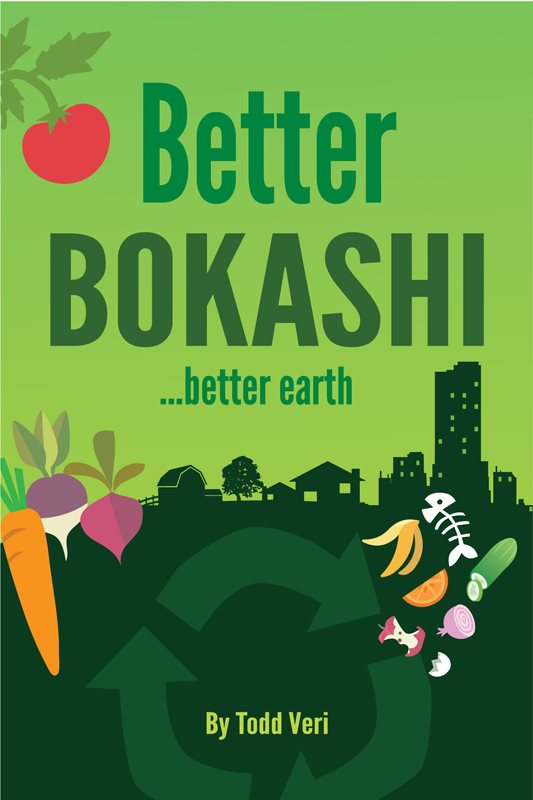

My introduction to Bokashi came in 2008, while my daughter and I were living in London. There was a local initiative to encourage urban composting that enabled us to get a quality wormery with all the necessary supplies, including worms and delivery, for only 5! What a great deal especially as I was frustrated having only one option available to deal with my food waste: send it to landfill. I was already familiar with vermiculture as I had been feeding worms my garbage on and off for about 10 years, so I knew we would have fun with them. (I did not envision one priceless moment when I came upon my 5-year-old daughter with a handful of straws and some squiggly friends playing ringleader to her own personal worm circus!)
I also knew that worms had their shortcomings, which meant we were still going to be tossing some of our food waste in the garbage, but it was better than the alternative.
It was unfortunate that the initiative was not promoting Bokashi composting as well; the company that supplied the worms (wigglywigglers.co.uk) had an entire page in their catalogue touting its virtues and it immediately grabbed my attention. But to tell you the truth, at first it only grabbed the attention of the cynic in me: it sounded too good to be true. How could you have meat in a bucket in your kitchen for weeks and not have it smell, and how come I had never heard of it before?
Intrigued, I started to research Bokashi in my spare time and the more I learned, the more fascinated I became. I was not able to start my first Bokashi bucket until I returned to Canada a year or so later but by that time I was eager to jump on the Bokashi bandwagon.
Back in Canada I had more time to search the various sites that promoted Bokashi and it quickly became apparent that much of the information available was contradictory, everyone had an opinion on the best way to Bokashi, and no one wanted to talk about the problems and smells that sometime occur. Wanting to find clarity and understanding that the only way Bokashi could become mainstream was if the process was made as simple and hassle-free as possible, I made it my mission to try any and all methods of Bokashi and to learn as much about the process as I could.
Since then I have made just about every Bokashi mistake imaginable: I have dealt with horrible messes, terrible smells, and one time experienced the shame of having guests run screaming from my kitchen. But with the possible exception of breaking up my dinner party, that was the plan: I wanted to find out was does and doesnt work when it comes to Bokashi. In the end, as often is the case, the answers ended up being quite simple.
My goal was to write a book that made Bokashi approachable and easy to learn, so that you would not only start Bokashiing yourself but be motivated to show and tell others. Lets change the world with Bokashi one kitchen at a time.
Better Bokashi...better earth.

Bokashi (pronounced bo-KAW-she) is a Japanese term meaning fermented organic matter. It usually refers to a method of indoor composting that uses beneficial micro-organisms (MyCrobz) to quickly ferment any type of food waste. This includes fruits, vegetables, meat, fish, small bones, bread, dairy, soiled paper, cooked foods, and more.
Indoor Bokashi composting is a relatively new take on the traditional type of outdoor composting (also called Bokashi) practiced in south-east Asia. Todays Bokashi is a simple 2-stage process that (when done correctly) produces no gas, heat, or rotten smells. It does not attract unwanted visitors such as vermin, maggots, or even bears, making it suitable for almost any situation that produces food waste.
Bokashi is great for moms, dads, teachers, kids, grandparents, office managers, chefs, gardeners, and the environment. It is one of the easiest ways to act locally (and think globally) with regard to reducing your carbon footprint. And its fun!
Bokashi is simply the best composting method for our time.
Benefits of Bokashi
Your reason for coming to love Bokashi will depend on your situation: a grandmother in a condo, a small cafe owner, or a family on a farm will all have different realities. The point is, if you are at all environmentally aware and consider all the composting options, you will come to love Bokashi (perhaps just out of necessity) because it is easy to learn, simple to do, and is hands down the best way to recycle food waste. Here are some of the benefits:
- Bokashi composting preserves all the nutrients in your food waste and adds MyCrobz and numerous beneficial compounds to the soil
- You can convert food waste to soil in as little as 30 days
- If you fully utilize your fermented waste you will never need to buy fertilizer for your garden again
- You wont have rotten smells or ugly messes to clean up
- Fermented waste does not attract vermin, house flies, skunks, or bears
- Bokashi composting does not create greenhouse gases or heat during either stage of the processthis is unique in the world of compost!
- Bokashi is suitable to any size household, school, office, business, or event
- Bokashi reduces the volume and smell of the garbage you produce
- Great for do-it-yourselfers, as you can use recycled items to make your Bokashi Bucket and you can make your own Bokashi Starter
- Bokashi is a great teaching aid for science class
- Its eye opening: you get to see the actual amount of food waste you produce (eye-opening)
- Recycling food waste helps the environment--and that makes you feel good!
- Its simply the easiest and most environmentally friendly way to recycle food waste
The concept of Bokashiculturing micro-organisms to ferment waste into fertilizerlikely has its roots somewhere in south-east Asia. No one seems to know for sure.
The first modern promotion of Bokashi composting came with the Nature Farming movement of Japan and Korea in the 1930s. Nature Farming is similar to the Biodynamic movement that took place in Europe around the same time. Both were early examples of sustainable organic farming systems.
The Bokashi practiced by these nature farmers was Traditional Bokashi, a method of outdoor composting that used easily cultured IMs or Indigenous Microorganisms (naturally occurring lactic acid bacteria and yeast) to quickly turn animal and agricultural wastes into an organic fertilizer. Heat and smells were created in this process, but the temperature was maintained at a lower rate than conventional composting and thus more nutrients were preserved, along with enzymes, amino acids, and many of the microbes.
Traditional Bokashi differed from todays Bokashi in two critical ways: it used IMs instead of EM and it was not an anaerobic (air-tight) process. EM (Effective Micro-organisms) are the combination of beneficial micro-organisms that were accidentally discovered in the 1980s by a soil scientist in Japan.
Font size:
Interval:
Bookmark:
Similar books «Better Bokashi: …Better Earth»
Look at similar books to Better Bokashi: …Better Earth. We have selected literature similar in name and meaning in the hope of providing readers with more options to find new, interesting, not yet read works.
Discussion, reviews of the book Better Bokashi: …Better Earth and just readers' own opinions. Leave your comments, write what you think about the work, its meaning or the main characters. Specify what exactly you liked and what you didn't like, and why you think so.



